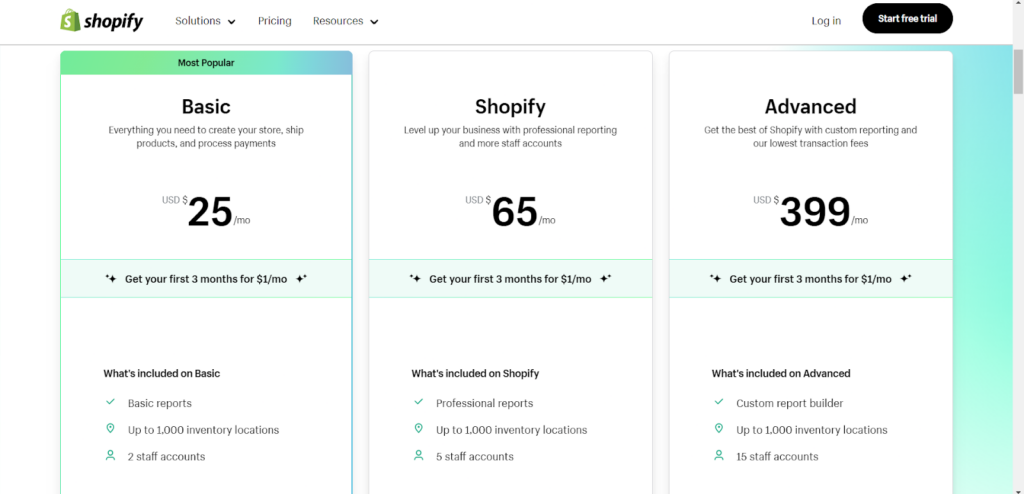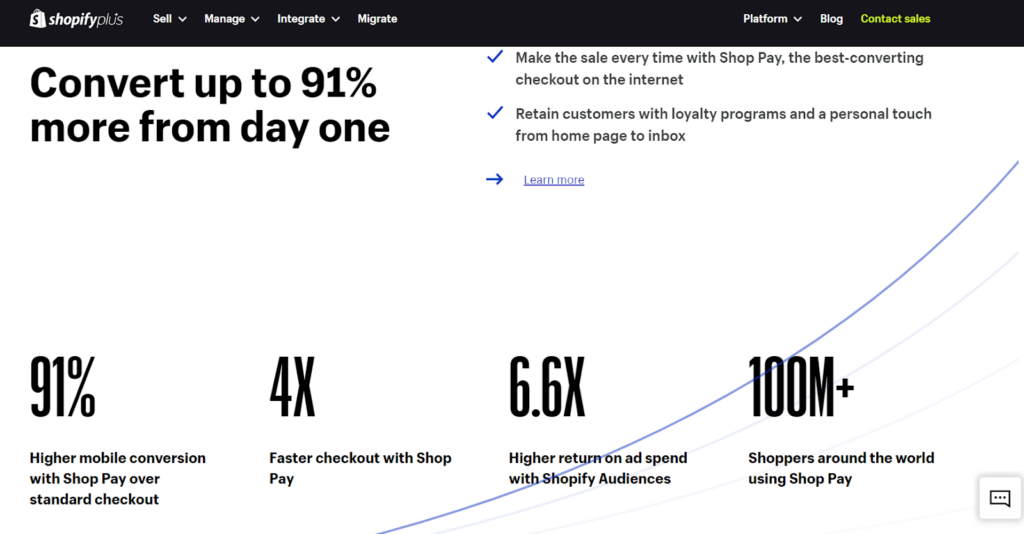If you’re looking to start an online business, creating a website is one of the most important steps. With so many options available, it can be overwhelming to choose the right e-commerce platform for your needs. However, Shopify offers tons of benefits that make it an excellent choice.
Why Should I Use Shopify?
One of the main advantages of using Shopify is its pricing plans. The basic Shopify plan starts at $29 per month and includes everything you need to get started with your online store. This includes reliable hosting, a free trial period, affordable templates, and web designers who are experienced in designing custom storefronts.
In addition to its affordability, Shopify offers a variety of benefits that make it an excellent choice for online businesses. Here are some of the key advantages:
Now coming to the main question, how much does it cost to create a Shopify website?
The cost of creating and setting up a Shopify website doesn’t involve a single cost. However, it depends on several factors, such as the subscription plan you choose, theme cost (unless you choose a free theme), payment gateway costs, development costs, etc.
Before starting with a Shopify website, you need to choose the subscription plan depending on your needs!
Cost#1: Shopify Subscription Plans
There are three main plans offered by Shopify, each tailored to meet various needs and budgets. These include Basic Shopify ($25/mo.), Shopify ($65/mo.), and Advanced Shopify ($399/mo.).
Higher-tier plans offer more advanced features, such as professional reporting tools and international pricing options.

Basic Shopify Plan: Ideal for startups or small businesses
For those beginning or managing a small eCommerce store, the Basic Shopify plan is an ideal option at $25 per month. This plan includes all the essential features needed to run an eCommerce store, like unlimited products, 24/7 customer support, reliable hosting, two staff accounts, and access to Shopify apps. However, transaction fees apply if you use third-party payment gateways instead of Shopify Payments.
Standard Shopify Plan: Suitable for growing businesses looking to scale up their operations
For businesses experiencing growth in sales volume and traffic or planning on expanding their product offerings further, they should consider upgrading from Basic Shopify to Standard Shopify, which costs $65 per month. In addition to everything included in the Basic plan, this tier offers five staff accounts, lower credit card rates (2% transaction + 30 cents), gift card functionality, as well as professional reports that can help analyze your business performance better.
Advanced Shopify Plan: Designed for large enterprises with complex requirements
In addition to these plans, Shopify offers a Shopify Plus option for enterprise-level clients requiring even more extensive capabilities. They also provide a 14-day free trial, allowing you to test out their platform before committing financially. The plus plan cost ranges from $2000 per month and above.

Cost Of Shopify Subscription Plans: $25 to $399 monthly
Cost#2: Design Costs & Theme Selection
One of the essential aspects of creating a Shopify website is selecting an appropriate design that reflects your brand identity and provides a seamless user experience. The Shopify theme store offers tons of free and premium themes to choose from, catering to various industries and styles.
Free Themes vs. Premium Themes
Free themes: For businesses operating on tight budgets or just starting, Shopify’s selection of free themes can be more than sufficient. These templates offer basic customization options, allowing you to create a functional online store without incurring additional costs.

Premium themes: If you’re looking for advanced customization options and unique designs, investing in a premium theme might be worth considering.
Ranging from around $100-$180 per purchase, these high-quality templates provide enhanced functionality that can help set your store apart from competitors while offering an engaging shopping experience for customers.
Cost Of Shopify Premium Themes: $100 to $180 monthly
Cost#3: Development Expenses & Professional Assistance
Creating a custom Shopify store tailored to your brand’s unique requirements can be a significant investment, especially when hiring professional designers and developers. The cost of development can range from $45-$55 per hour or higher for specialized services, depending on the complexity of your project.
Hiring Freelancers vs. Agencies
Shopify offers tons of certified partners, including both freelance web designers and full-service digital agencies that specialize in creating bespoke online stores on their platform. When deciding between employing an independent contractor or a firm, it is critical to consider variables such as financial resources, the desired degree of personalization, continual assistance needs, and overall task administration preferences.
Typical Project Scope & Timeframes
The cost of developing a custom Shopify website depends heavily upon its complexity – ranging from simple template modifications (basic Shopify theme customization using Liquid code language) to fully customized storefronts with advanced functionality integrations. Consequently, project timelines can vary significantly based on factors such as:
A simple Shopify store with minimal customization might take a few weeks to complete, while more complex projects requiring extensive development work could span several months. It’s crucial to communicate your desired launch date clearly when discussing project scope and timeline expectations with potential designers or developers.
Cost Of Shopify Development expenses: $500 to $2000 monthly
Cost#4: Payment Gateway Fees
Selecting a payment gateway is necessary for taking credit card payments via your website. Shopify offers its native Shopify Payments, as well as support for third-party payment gateways like PayPal. Each option comes with processing fees that usually consist of both percentage-based rates and fixed transaction amounts (e.g., 2.6% + 30 cents). These fees should be factored into the total cost of running an eCommerce store.
Shopify Payments vs. Third-party Payment Gateways
Shopify Payments is the platform’s built-in solution, offering seamless integration and competitive transaction fees depending on your chosen subscription plan. For those on the Basic Shopify plan, transaction fees amount to 2.9% + 30 cents per sale, whereas for Advanced Shopify users, it’s only 2.4% + 30 cents.
If you prefer using a third-party payment gateway, such as PayPal, keep in mind that additional charges may apply based on their pricing structure, which could result in higher overall costs compared to using Shopify Payments.
Reducing Transaction Costs
Be sure to compare transaction fees between Shopify Payments and third-party providers while considering factors such as ease of integration, security features, and potential cost savings through reduced rates or negotiations.
Now let’s look at how app integrations and add-ons can help enhance the functionality of your Shopify website.
Cost#5: App Integrations & Add-ons
Thousands of apps exist in the official Shopify app store, designed explicitly for enhancing functionality across various aspects, such as email marketing automation integration or social media management tools. These often come at an additional expense depending upon individual developer pricing models but can significantly enhance the overall customer experience when properly implemented into one’s storefront environment.
Popular Apps to Enhance Store Functionality
Budgeting for Essential Add-ons
Identifying the most beneficial features for your online business should be prioritized when considering app integrations. To make an informed decision, evaluate your store’s current performance and identify areas that could benefit from app integrations. Next, research available apps in those categories and compare their pricing plans.
Many Shopify apps offer free trials or tiered pricing models based on usage levels, making it easier to find affordable options that suit your needs. For example:
Remember that investing in high-quality add-ons can lead to increased sales conversions and improved customer satisfaction – both of which contribute positively towards long-term success within the eCommerce space.
App integrations and add-ons are essential for creating a successful Shopify website, as they can provide extra features to enhance the user experience. However, investing in SEO services is just as important when it comes to boosting your store’s visibility online; let us explore typical pricing models and packages that you should consider.
Cost Of App Integrations: $20 to $100 monthly
Cost#6: SEO Services & Marketing Investment
Enlisting the help of SEO companies to develop a search engine marketing plan can be an essential investment for driving traffic and increasing sales. The cost of these services varies, but it is crucial to allocate resources towards effective online marketing strategies that will attract potential customers and boost your eCommerce business.
Benefits of Investing in SEO Services
Typical Pricing Models & Packages
The cost of hiring an SEO company depends on various factors such as project scope, desired results, and agency reputation. Here are some common pricing models used by agencies when offering their services:
To maximize ROI (Return On Investment) when investing in SEO services for your Shopify store, it’s essential to research different agencies’ offerings carefully. Make sure you understand their pricing structure and what they include within each package before committing financially. Also, consider checking reviews or asking for referrals from other successful eCommerce businesses that have utilized these services in the past.
Investing in SEO is a wise move that can reap rewards for your business over the long haul. Exploring what POS integrations are available can be a great way to boost the efficacy and profitability of your e-commerce store.
Cost Of SEO expenses: $500 to $5000 per website
Cost#7: Point-of-Sale (POS) Pro Add-on
If you’re running a business that requires point-of-sale features, Shopify offers a monthly add-on called “POS Pro” at an additional cost. This feature enables seamless integration between your physical retail location(s) and your online store, making inventory management more straightforward while providing valuable data insights on customer behavior.
Advantages of POS Integration with Your Online Store
Cost Analysis & ROI Considerations
The POS Pro add-on is available for an additional $89 per month, regardless of your main plan.
When evaluating the potential payoff of including this feature to your store, it’s necessary to compare its advantages and expenses. Some factors to consider include:
Cost Of Shopify POS Pro Integration: $89 monthly
Cost#8: Product Shipping Options
If you plan on shipping physical products, you’ll need to consider the cost of shipping. Shopify offers several shipping options, including real-time carrier shipping rates and manual shipping rates. Real-time carrier shipping rates are calculated based on the weight and dimensions of your products and the destination address. Manual shipping rates allow you to set your own shipping rates based on your criteria.
No Cost Of Hosting
Shopify provides reliable hosting for your online store, which is included in the monthly subscription fee. This means you don’t need to worry about finding your hosting provider or dealing with server maintenance.
Final Verdict: How Much Does it Cost to Create a Shopify Website?
Overall, the cost of building a Shopify website can vary widely depending on your needs and the features you require. However, to give a rough idea, your Shopify website can cost from around $100 to $5000, depending on how you create your website.